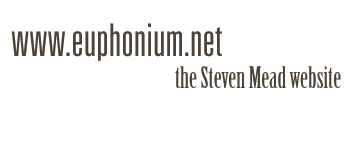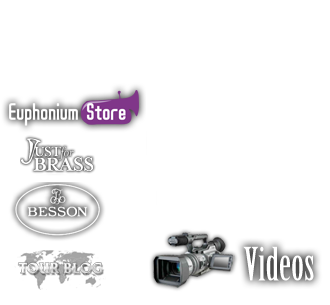The first review for the Hosanna CD has arrived (thanks to The British Bandsman magazine):
"There are very few musical instruments whose leading exponents have done as much to develop their particular instrument in terms of repertoire, construction and exposure as have the current crop of euphonium players. At the forefront of this, for several decades now, has been Steven Mead, whose international profile and reputation has been deservedly earned both by developing new and more advanced instruments and by adding to the ever growing euphonium repertoire through his countless commissions of new original music and arrangements.
HIs latest release, Hosanna, fits very much in to this ethos. A chance meeting with the Polish organist Lidia Książkiewicz led to further meetings, when the two performers tried out existing brass and organ literature. The collaboration has led to an extraordinary recording, which I can recommend not only to any euphonium or brass enthusiasts, but to any music lover. The repertoire explores three centuries of music and as such requires different musical styles, all of which are performed with a real sensitivity by both protagonists. From a personal point of view, I particularly enjoyed the subtle variety offered by recording two different organs, in Laon Cathedral in north east France, where Lidia Książkiewicz is
the resident organist and a smaller organ, more suited to baroque repertoire, in nearby Guignicourt.
The CD opens with a work 18th century composer and oboe virtuoso, Alessandro Besozzi. This enjoyable four-movement Sonata is stylistically performed; the biggest compliment I can pay to the artists is that it sounds as though it was actually written for euphonium! A movement from Albinoni's Oboe Sonata, from a similar period, is equally stylish and incredibly natural sounding. Music from the 1700s is beautifully balanced with works from a more contemporary sound world.
Sandström's compact Lacrimae, Lacrimae (1991) is an incredibly effective piece of writing, dissonant and at times complex, but the performance captures a sense of beauty, somehow making the complexity immediately understandable. The same can be said
of the reading of Gardner Read's substantial Invocation Op.135, in which the fine musicianship on display creates a highly enjoyable experience for the listener.
Gustav Holst's youthful Duet, originally written for trombone and organ, is skilfully delivered. In Andrew Lloyd-Webber's Pie Jesu, Steve is joined by Japanese euphoniumist Misa Akahoshi (who also joins him in Caccini's Ave Maria). The title track, Hosanna (Liszt) and Schubert's ever popular Ave Maria are two of several classical
and romantic period works on the disc. These allow the soloist to express himself, and for Lidia Książkiewicz - if you forgive the pun - to literally pull out all the stops!
This is a superb recording, both in the quality of the performances and the recorded sound. Producer and engineer Richard Scott was able to blend both instruments perfectly, whist ensuring enough definition between the organ(s) and euphonium(s).
Dr.Peter Meechan

